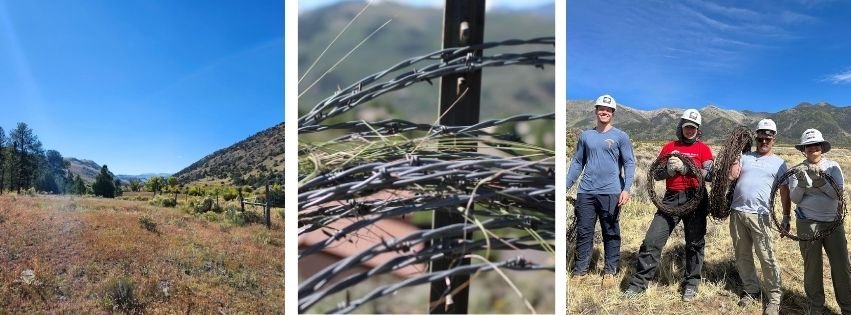
Where You’ll Be:
It’s easy to spot Middle Creek on a land ownership map. It flows south from the Continental Divide before joining Saguache Creek near its namesake town. For years, this area was mostly out of reach, as private land flanked both sides of Middle Creek for miles.
Driving north you see a sprawling paradise of national forest and BLM lands just beyond that private land, growing ever sweeter as you go. But until recently all that most folks could do was stare longingly at that landscape until they reached a public trailhead at the road’s end. From there anyone hoping to hunt, hike or ride horseback in that grand country to the south—the aspen, sage, meadows and black timber of the Bear Creek Roadless Area—faced miles of steep backtracking.
But times are changing fast. The Rocky Mountain Elk Foundation (RMEF) just purchased a 24-acre parcel two miles south of the road’s end that is now owned by all Americans and in the stewardship of the BLM. This land will provide a new public access point to both sides of Middle Creek, finally opening the gate for people to enjoy all the beauty this area offers.
What You’ll Do:
The primary purpose of the project is to allow wildlife, particularly deer and elk, safe movement throughout the property. We will be improving the habitat by removing some of these old fence lines. This entails cutting the barbed wire into manageable sections, rolling it up, pulling up old t-posts and wooden posts, and packing out the old material to be hauled off and recycled.
Sections of fencing that need to remain will be repaired and converted into wildlife-friendly fencing, featuring smooth top and bottom strands to reduce injury to wildlife attempting to cross through.
Tasks will involve working with barbed wire, carrying fencing materials, and hiking on uneven terrain. Proper clothing and safety gear are required, including leather hiking boots (or work boots), long-sleeved shirts, and long pants. Leather gloves and eye protection are also required, but will be provided.
Breakfast and lunch are provided on Saturday and Sunday, along with dinner on Saturday.
Bring your own dinner for Friday night and enough snacks for the weekend.
Free campsites are available on Friday and Saturday nights, and we recommend arriving at base camp before 8 pm on Friday.
Support This Project as a Crew Chef Helper!
We provide full meals on our overnight projects to ensure volunteers are well-fed and ready for a day of volunteering — and we could use your help to make it happen!
View this document to learn more about how to support and sign up!
This project will help protect wildlife, including deer and elk populations. Although deer and elk can jump fences, they can easily become injured or entangled, sometimes dying of trauma and dehydration. Animals can be hindered by deep snow or steep slopes, and young, pregnant, or winter-stressed animals may struggle to clear fences as they forage and migrate in search of food. Large, low-flying birds, especially raptors diving for prey, can collide with fences and break wings, hurt themselves on barbs, or tangle in wires.
By removing outdated fences and installing wildlife-friendly alternatives, this project will help protect local wildlife populations while improving habitat connectivity. Additionally, the work supports the BLM’s goal of offering improved recreational opportunities and access to public lands in this area.
Eligibility Requirements:
Ages 16+
Sawyers must be 18+
For overnight projects, all youth under 18 must be accompanied by an adult aged 21 or older.
On this project, we need 1 B-certified Chainsaw Sawyers, A-certified Sawyers will be able to work under the supervision of B Sawyers. If you are certified, please include this information in the comments section of your registration and send a copy of your certificate to the project manager. ALL SAWYERS MUST HOLD A CURRENT FIRST AID AND CPR CERTIFICATION IN ORDER TO OPERATE A SAW. Want to get certified? Visit our Training Calendar for upcoming training opportunities.
Project Difficulty:
This project is considered moderate to difficult. Please check our difficulty rating criteria here for more details.
Physical Considerations:
Fence removal and installation require a high level of care. Volunteers may need to move heavy materials. While fence removal may be lighter-duty work, all tasks require physical effort and hiking on uneven ground.
Access Factors:
Vehicle Access: No vehicle restrictions – 2WD accessible
Other Notes: Tent, car, and small trailer camping are acceptable. Bathrooms are available in a nearby cabin, but the cabin is not suitable for overnight stays.
Join us in reducing our carbon footprint by carpooling!
Click here to sign up for the carpool (please do this after registering for the project).


